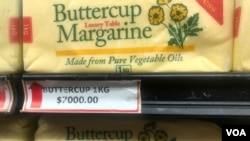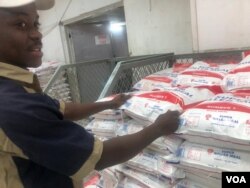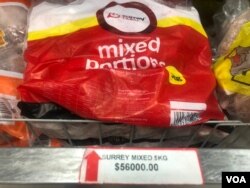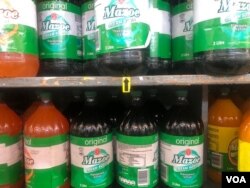WASHINGTON - Zimbabwe’s Ministry of Finance has lifted all restrictions on the importation of basic commodities amid skyrocketing prices of bread, flour, cooking oil and mealie-meal and other goods.
In a statement, Finance and Economic Development Minister Mthuli Ncube said, “In order to enhance the supply of basic good to the public, all basic goods will no longer be subject to import licences, and will also come into the country free of import duties and taxes.”
Ncube said this has been largely a result of the resurgence of macro-economic instability with domestic inflation being driven primarily by the “skewed preference for the US dollar as a savings currency.”
Ncube added that this has “put enormous pressure on the exchange rate as the skewed preferences have continued to increase the velocity of the Zimbabwe dollar, currently trading at ZWL$1,116.75 against the US dollar.
On Friday the local currency was fetching at least ZWL$2,350 per US$1.
Ncube said demand for the US dollar has been growing in Zimbabwe and “it is estimated that a large portion of domestic transactions are now being conducted in foreign currency.”
He further said Treasury has also decided to introduce a 100% retention of domestic foreign currency sales.
Ncube said, “In order to promote the banking of domestic sales foreign currency in the banking system, the Reserve Bank of Zimbabwe will with effect from 15 May, 2023, exempt all proceeds from domestic sales in foreign currency from the 15% surrender requirement.
He also noted that all external loans to the government will not be transferred to Treasure while the Foreign Exchange Auction System will be further fine-tuned along the lines of a Dutch auction basis.
Critics say the new measures won’t stop the free fall of the Zimbabwe dollar.
Japhet Moyo, secretary general of the Zimbabwe Congress of Trade Unions, said, “We don’t know if this will help our local industries as basic goods from South Africa will be duty free. All these goods will eventually be sold in US dollars locally and we don’t see that benefiting people of Zimbabwe.”
At the same time, Moyo criticized Treasury for taking over external Zimbabwean loans, which were under the Reserve Bank of Zimbabwe.
‘We have seen in the past Treasury taking over loans from the central bank which embarked on quasi-fiscal policies when it helped some individuals to buy agricultural equipment like tractors and other farming implements. This is happening again and we don’t know what these loans are all about.”








